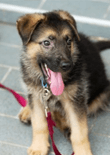German Shepherd Puppy Training
By Sally Gutteridge | Breeds

 The German shepherd is a charming puppy. Loyal and humorous the shepherd is cute as a youngster and dignified as an adult. All puppies need socialization and basic positive learning experiences in order to grow into well rounded dogs. The German shepherd is no exception.
The German shepherd is a charming puppy. Loyal and humorous the shepherd is cute as a youngster and dignified as an adult. All puppies need socialization and basic positive learning experiences in order to grow into well rounded dogs. The German shepherd is no exception.
If you have a new German shepherd puppy or are thinking of getting one then you will not be disappointed. A loyal and brave dog with intelligence and attentiveness the Shepherd is a great canine companion. There are guidelines that you can follow to ensure that your new dog grows into a happy and well trained friend.
Socialize your puppy
German shepherd puppy training should be complemented with suitable socialization. The shepherd by nature can be reactive and protective when scared therefore he must be introduced to as many new things as possible, from a very young age.
With socialization of a puppy you are teaching him that there is very little to fear in the world around him. A puppy is generally friends with everyone and everything when he is born. If he learns to fear particular things as he grows into an adult dog then those fears will stay with him forever. This fear can be just as intense for the dog if he has few social experiences as a puppy. A natural reaction from an under socialized dog is fear. This reaction can be very difficult to modify in an older dog.
A puppy that has many different experiences that are all pleasant and stress free will grow into a confident and happy dog. The German shepherd puppy that is allowed to play at the park, with other young dogs (and under supervision) will benefit greatly. Also, playing with adult dogs will teach your puppy manners and etiquette.
Socialization should begin as soon as possible. The first few weeks of a dog’s life are crucial for learning. There are mixed opinions around taking an unvaccinated dog out of the home, but a puppy tucked under your jacket is still getting social experience. If you are happy to carry your dog into social situations before vaccination then it is well worth the effort.
Good puppy socialization will include regular contact with
You can obtain a socialization CD to play in the background at home. Fireworks, storms and other noises that may cause stress will then be introduced to your dog slowly until they are simply not noticed at all.
Your German shepherd puppy training requirements
Training your dog must always be a positive experience for him. German shepherd puppy training must be based on reinforcement and reward of good behavior and non-acknowledgement of unhelpful behavior.
Good, kind and affective German shepherd puppy training is based on:
The above technique can be employed within dog training in most circumstances. For instance toilet training, by taking your puppy outside and ignoring him until he toilets, then instantly rewarding him, you are encouraging the behavior that you want. You can then add a cue word as he begins to toilet which you can use each time he goes out.
A highly intelligent dog, the German shepherd puppy will learn quickly and thoroughly if taught properly. Remember that your puppy is a responsive and loyal blank canvas. He will be biddable and eager to learn, so it is up to you to shape him into a happy well trained dog.
There will be times when you must intervene in an unwanted behavior from your puppy. If this occurs then it will be most useful to offer him something different to do. Take his mind off the unhelpful behavior by capturing his interest with a toy or something similarly distracting. Be careful though, that you don’t allow him to confuse the distraction with reward, and therefore reinforce the unhelpful behavior.
German shepherd puppy training is essential if you are offering a home to this breed of dog. A well trained shepherd is easy to live with, but untrained or under socialized the shepherd can develop fear based and reactive behaviors.
Session expired
Please log in again. The login page will open in a new tab. After logging in you can close it and return to this page.
my gsd is 6 weeks old now but he is not responding to any of my commands …..please help
The thing is with commands, is that the dog doesn’t understand your commands unless he has been conditioned to respond a certain way to that particular command. I’d recommend that you take a look at our upcoming obedience training course which talks about this in greater details.
I found this very informational and when used it is very successful. Thanks so much for the insight.
I have bought a 7 week GDS … can i start training it from now?
Absolutely. You can begin training your puppy as soon as he comes home, but obviously in the beginning you will be working more on social and house training skills rather than obedience. 🙂
my GS puppy is 4 months old he don’t know orders except “set ” could you tell me please how to start training my Dog
im getting a german shepherd in a couple weeks! so pumped
I got 2 nine week old puppies at the same time this is going to be fun
hi my GSD is 18 weeks old, I have 2 issues first is jumping up on myself, visitors, even strangers on walks. Second is how to stop her barking AFTER the alert bark has been acknowledged, I have tried thank you treat, enough Leia, quite thank you, but not helped and now have to exclude her to what is going on by putting her in room for 10 minutes, when visitor leaves.